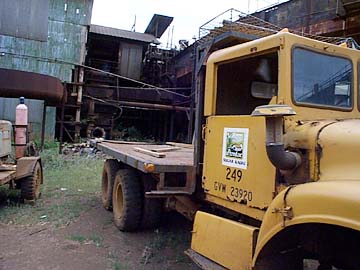Advertisement - Click to support our sponsors.


Sugar’s demise LIHUE -- Like watching a long-suffering relative dying of a terminal disease, Kauai residents were not surprised by the announcement yesterday that Amfac/JMB will begin shutting down its sugar plantations on Kauai in mid-November.
‘pretty obvious’
Kauai once had 9 thriving mills,
but just one will remain
after NovemberBy Anthony Sommer
Star-BulletinBut they were saddened.
The closure of Amfac's Lihue Plantation and Kekaha Sugar Co. will leave Gay & Robinson's Olokele Plantation as the sole survivor of what once were nine thriving Kauai sugar companies.
"It was always a question of 'when' rather than 'if' and quite frankly, I thought they would close sooner," said Tony Faye, who worked for Amfac for 32 years and managed the Kekaha Sugar Co. from 1980 to 1992.
"It was pretty obvious. The crop was so thin you could run through the fields. The amount of sugar being produced was negligible," said Faye, whose father and grandfather managed the Kekaha plantation dating back to 1898. "Amfac/JMB was really a realty company trying to farm."
Alexander and Baldwin's Puunene Mill on Maui is the state's only other surviving sugar plant after A & B announced Wednesday it was closing its Paia Mill.
The layoff of 400 sugar workers is the largest single agricultural layoff in Kauai's history and eliminates almost half the island's 850 agricultural jobs, not counting self-employed farmers. But as county agriculture economics expert Bill Spitz points out, agriculture long ago ceased to be the major employer on Kauai. The island has 24,600 workers in non-agricultural jobs.
Mayor Maryanne Kusaka issued a statement saying training funds are available to the laid-off workers.
The employees range from highly-paid mechanics and heavy equipment operators, who may be hard pressed to find jobs with equal salaries, to laborers. Although all the employees work on a plantation, few are experienced in running a small farm, Spitz noted.
"There may be too many of them to be absorbed by the economy," Spitz said.
In its announcement yesterday, Amfac/JMB said severance benefits are yet to be negotiated.
"We're working to set up negotiations," said Clayton Dela Cruz, Kauai Division director for the International Longshore and Warehouse Union local that represents the sugar workers.
"We have no severance agreement."

The plantation employees have been working without a contract since Jan. 21.Three years ago they agreed to accept a 10 percent cut in wages to help save the company.
"It seems it didn't," Dela Cruz said.
The end of Amfac/JMB's sugar operations means some tough decisions for the surviving Gay and Robinson company, which could see its costs increase.
Amfac/JMB and Gay and Robinson currently share the cost of renting and operating the sugar terminal at Nawiliwili Harbor where raw sugar is loaded on ships to be refined.
"If we have to pick up all the cost, it will mean another $500,000 to $600,000 in expense to us," said Alan Kennett, Gay & Robinson president and general manager. "That would kill us.
"We're having a big meeting tomorrow and a lot will have to be decided over the next few weeks," Kennett said.
About 17,000 acres of Amfac/JMB's sugar lands are up for sale, possibly to grow timber.
On the west side, Amfac/JMB has a lease with the state Department of Land and Natural Resources on the 28,000 acres used by Kekaha Sugar Co.
Gay & Robinson has indicated it is interested in the 7,000 acres now in sugar. Most of the rest is swamp.
One side issue is the effect on the Navy's Pacific Missile Range Facility.
Huge pumps keep water from the lowlands from inundating parts of the facility -- including the base headquarters. Whether the state, as owner of the land, would be required to continue to operate the pumps if Amfac/JMB gives up its lease is not clear.
The Department of Land and Natural Resources did not respond to questions yesterday.
Also unclear is whether Amfac/JMB will continue to provide electricity to Kauai Electric.
Lihue Plantation currently provides 14 megawatts of the utility's 110 megawatt output by burning bagasse, the fiber left over in the sugar milling process, to fuel its generators located in the mill.
The company's contract with Kauai Electric calls for monetary penalties if it fails to give three years' notice that it is shutting down its power generators.
"They can burn oil instead of bagasse; they've done it before," said Jenny Fujita, Kauai Electric spokeswoman.
"But it is much more expensive."
Amfac/JMB would also have to obtain air quality permits to continuously fire the generators with oil.